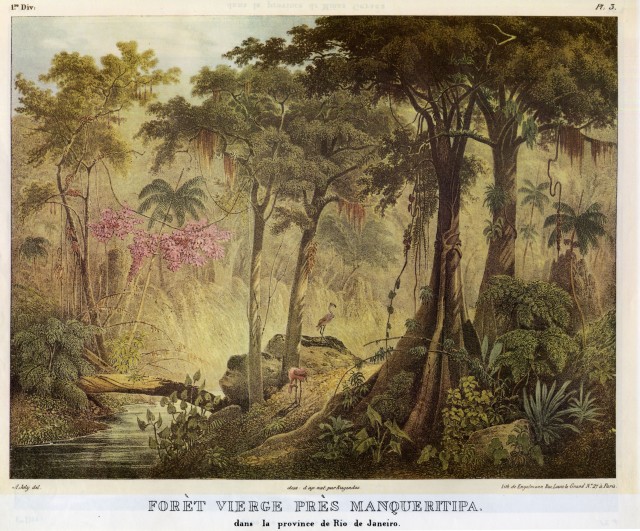This is the most realistic, low-key Cesar Aira novel I have read yet. A strange thing to say about a story that has an Indian raid and a man struck by lightning. Other than the immediate effects of the strike, though, there’s nothing that approaches the fantastic coincidences, ghosts and B-movie monsters of his other novels. The main character is even a real person.
In the early nineteenth century, German landscape painter Johann Moritz Rugendas is making his second trip to South America. He has already published a successful book of engravings of Brazil. Under the influence of Alexander von Humboldt, he intends to make a more systematic record of the forms of the natural world. He diverges from his mentor, however, in being drawn from the profusion of the tropical jungle to the vast emptiness of the Argentine Pampas. As Rugendas descends from the Andes, heading eastward into the plains, Aira writes suggestively of the shocking volumes of empty air, and of great wagons carrying goods from Mendoza to Buenos Aires which travel so slowly that to the traveller they seem to move backwards in time.
In Varamo, Aira purportedly constructed a day in the life of a civil servant so disastrous and improbable that it inspired a modernist poem of the utmost genius. Episode is a more complicated version of artistic inspiration. Rugendas’ mastery and dedication to his art are emphasized from the beginning. Also, from the beginning we are prepared for a crucial turning point in the artist’s life, a catastrophe. After being struck by lightning, dragged by his horse, and badly disfigured, Rugendas is afflicted with horrendous migraines and becomes dependent on opium. And yet, he remains the artist. Things seem to go on almost as before.
I read this very fast and can’t pretend to give a totally coherent explanation. Clearly, Aira is commenting on the artistic life in general. Rugendas faces constant uncertainty and challenges from both within and without. It’s interesting that he writes a great deal in the aftermath of his accident; it’s not creative writing, but in merely corresponding with his patrons and relatives, he describes the same events in ways that don’t seem to be the same. It’s hard to pin down Aira’s tone, and I’m sure his sufferings could be read as brutal satire rather than some kind of tribute. Some later scenes of the novel are more like the madcap Aira I had been used to, but the stage props are more down to earth, such as a mantle or veil with which Rugendas protects his dilated pupils.
The more I think about it, the more I can imagine returning to this book ahead of Aira’s others, not because it’s immediately more enjoyable, but because the plot seems to conform more closely to his philosophic preoccupations. On the whole, An Episode in the Life of a Landscape Painter reads like some type of fantasy art history (not a real genre as far as I know), or like reports of the lives of explorers and soldiers which astound us with their violence and heroism while maddening with their laconic dignity.
